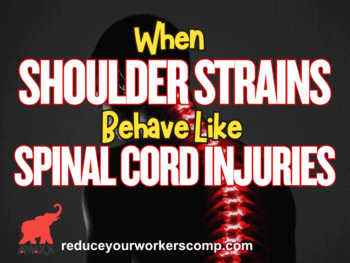
There are many strange and oddball issues that claim handlers confront when managing their workload. This includes instances of making primary liability determinations when the work injury happens during work hours, but the activity connected to the injury was not necessarily “work-related.” These can include matters such as break times, working at home, recreational and wellness events, and horseplay.
These claims require the claim handler to conduct a diligent investigation and apply the law. Failure to do this can result in extra money being spent on a claim, as well as needless litigation.
It All Starts with the Investigation
The First Report of Injury is generally submitted from the employer to the workers’ compensation carrier. The claim is then developed through distribution to the team for investigation. The First Report of Injury often includes incomplete and inaccurate information. This can be prevented by taking the following steps:
- Educating employer representatives on work injury investigation basics;
- Instructing employer representatives in how to preserve and document evidence; and
- Providing resources and reporting tools that are easy to use.
These proactive steps can increase reporting accuracy and efficiency.
Click Link to Access Free PDF Download
“How Do I Get My Adjusters To Follow My Account Handling Instructions?”
Getting All the Facts
Experienced claim handlers know that memories fade as time goes on. It is important to start an investigation on any claim as soon as possible. When it comes to injuries where a “personal comfort” may be at issues, time is of the essence. In addition to asking the right questions, make sure to take the time to listen when conducting a recorded statement of the employee and other witnesses:
- Be an “active listener.” It makes no sense to try and capture every detail in written notes, especially if a transcription will be made afterward;
- Preparation is key. Start with a basic statement form, and make notations of areas to explore during the telephone call. Claims that involve injuries while taking breaks, running errands, or horseplay hinge on specific details. Very rarely will you get a second chance to directly ask an injured employee questions about the claim; and
- Know the law concerning “personal comforts.” Attorneys that represent defense interests in workers’ compensation claims should be happy to field calls on these matters without opening a file. This may also allow members of a claim team to tap the knowledge of an associate within a law firm, or an attorney that has been seeking new business.
Personal Comforts: What Should I Know?
There is not an all-inclusive list of “personal comforts” that arise in workers’ compensation claims. Proceed with caution after preparing in a diligent manner.
- Injuries During Lunch and Miscellaneous Breaks: Injuries arising during breaks that occur outside the employer’s worksite, or employer supervision are generally not compensable. The lines become blurred when these breaks are paid, or an employee may be forced to walk from one employer-owned facility to another across a public street. Courts have usually applied the “special hazard” rule in these instances, and found the claims compensable.
- Workplace at One’s Home: This area remains a surprisingly undefined area of the law even though telecommuting has been on the rise over the last decade. Courts have looked to the activities being undertaken by the employee at the time of the injury, and any connection between the injury and employer-directed work;
- Recreational and Wellness Activities: Most workers’ compensation laws have specific waivers of liability when the activity is voluntary and is being used to promote healthy living, athletic events, and parties. Distinctions in the law have also been made when an employer pays money to promote an event where an injury occurs; and
- Horseplay: This area of the law is often misunderstood. Notwithstanding conventional wisdom, horseplay is generally compensable. Claim handlers should examine the location of the incident (g., on the employer’s premise or job site), who was involved, and what party initiated the horseplay. Courts have generally not been willing to compensate those who initiate mischief in the workplace, and almost never when it falls outside paid time at work – especially if it occurs after work hours.
Conclusions
Members of the claim management team need to investigate matters and make the correct decision. This process becomes complicated when the lines are blurred by employees seeking personal comforts or engaging in other activities that do not directly conform to the expectations and directives of the employer. By doing a better job when investigating these claims, claim handlers can issue proper denials that reduce workers’ compensation program costs.

Contact: mstack@reduceyourworkerscomp.com.
Workers’ Comp Roundup Blog: https://blog.reduceyourworkerscomp.com/
©2020 Amaxx LLC. All rights reserved under International Copyright Law.
Do not use this information without independent verification. All state laws vary. You should consult with your insurance broker, attorney, or qualified professional.





























